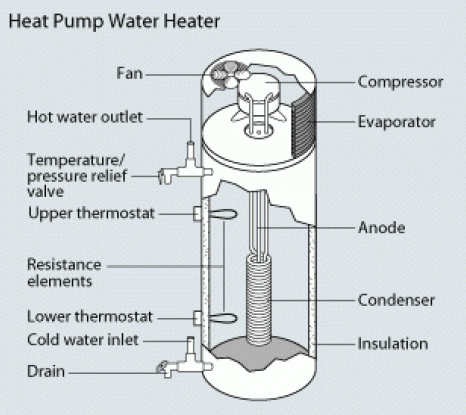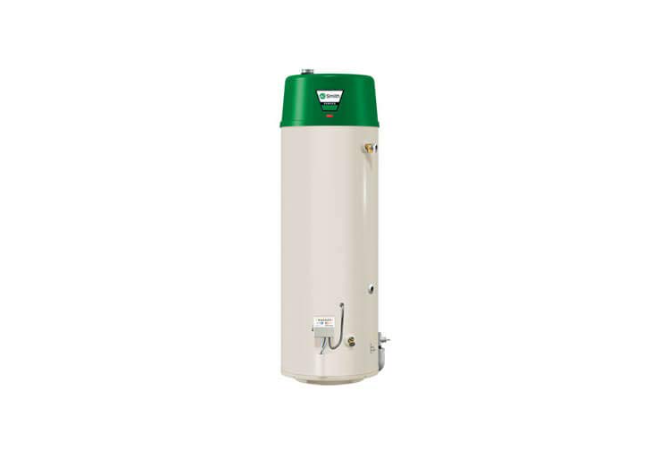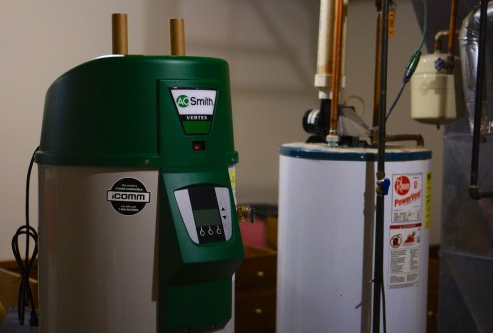What is a hybrid gas water heater, exactly? When it comes to replacing an old water heater, many people ask that question. When you get right down to it, the solution isn’t as complicated as you think. The gas hybrid water heater is based on how you’ll use it and your energy requirements, not on what the company or its salespeople would like you to believe.
This article will go over all of the factors to consider when looking for the hybrid water heater gas for your home.
What Is a Hybrid Water Heater?

A water heater hybrid combines tankless and tank water heating technologies; the unit has a reservoir for storing water but does not run continuously. These heaters work by absorbing heat from the surrounding air and transferring it to the water.
Heat pump water heaters combine all of the godsends of a traditional water heater with the efficiency of a heat pump. A water heater hybrid might be right for you if you live in a warm climate and your home’s appliances are all hybrid electric water heater (not gas).
The Work of a Heat Pump Water Heater?

A hybrid water heater, also known as a heat pump water heater, draws heat from the outside air into the evaporator coil of the appliance. Air is absorbed into the refrigerant, which moves heat to the electrolyte coil. Heat exchangers heat the water inside the heater tank before it pours into your bathroom, faucet, and appliances.
It’s helpful to imagine this process similar to how your refrigerator works but reversed. A heat pump water heater pulls hot air to heat the water rather than expelling it to cool the contents of a refrigerator or freezer. Like a tankless water heater, a hybrid electric water heater does not run continuously, making it more efficient than a traditional water heater. The tank will fill during periods of increased use, preventing households with multiple people from running out of water at critical times.
Hybrid Water Heater Upsides
1 – Hybrid Efficiency
The efficiency of hybrid water heaters is the most obvious advantage. Water heaters are notoriously inefficient because they did not regulate their energy consumption until 2008. It is especially concerning because they frequently consume the most energy in a home, accounting for nearly one-fifth of total energy consumption!
2 – Save Money
The consumer will save money because these models are more energy efficient. But what are the advantages of each of these models? Eternal Hybrid boasts a 98 percent efficiency rate. The Vertex Power-Vent Gas Water Heater from A.O. Smith is a hybrid water heater gas that operates at 90% efficiency. Meanwhile, GE’s model should be 50% more efficient than its current ones.
Vertex Power-Vent Gas Water Heater

GE’s savings should be around $250 per year for a typical family. Hybrid WaterHeater Inc. claims that it could save up to $2,160 per year in energy costs [source: Hybrid WaterHeater Inc]. You’ll have to wait until 2011 to put that one to the test.
3 – Easy To Install
If you’re looking for a simple installation, the GE and A.O. Smith models will fit most standard tank designs. On the other hand, the eternal water heater is about half the size and will save you space.
4 – Emit No Ozone
In addition, Eternal’s model emits almost no greenhouse gases. It means it’s one of the cleanest-burning household appliances on the market, not just water heaters.
Consider replacing your water heater with a hybrid water heater if it needs to be replaced or if you want to be greener — both in your home and in your wallet. Don’t worry about going out and getting one today; there aren’t many on the market right now. After a few years, you should have a plethora of choices.
Downsides of a Hybrid Electric Heat-Pump Water Heater
- Hybrids are much more expensive than traditional electric heaters.
- The hybrid gas water heater is taller (and in some cases wider) than the electric heater you currently have. Check to see if the unit will fit.
- Some heaters are “side-piped” to eliminate the risk of leaking pipes damaging the heat pump. The water pipes on those models will need to be reconfigured.
- To keep the system running smoothly, you’ll need to clean the air filter regularly.
- The heater needs at least 1,000 cubic feet of air for the heater to function.
Is It Possible To Use A Hybrid Water Heater In The Winter?
Because a hybrid electric water heater has electric heating elements, such a water heater can certainly work in the winter and even when it’s cold outside. If you don’t want to use auxiliary heat, keep the heater in an unconditioned or semi-conditioned space where the temperature stays above 50 degrees Fahrenheit all year.
The basement, next to the furnace, is the ideal location for your hybrid water heater. Also, a heat pump water heater that meets the Northern Climate Efficiency Specification is a good option. Such units, on the whole, have larger compressors that can work effectively even in colder climates.
Is a Hybrid Water Heater the Best Option for Me?
For some households, a gas hybrid water heater is an excellent choice. Heat pump water heaters require more space than tankless water heaters because they have tanks and thus are not suitable for small spaces.
The most efficient operation of hybrid water heaters necessitates a warm or at least mild climate. They will not work well in cold climates because they draw heat from the outside air.
Hybrid water heaters, last but not least, are electric. Because of the work required to retrofit the fittings, a home with a gas water heater or other gas appliances is not the best candidate for hybrid water heater installation. A separate high-voltage circuit and breaker would also be required.
How Much Does A Hybrid Water Heater Cost?
A hybrid water heater can be costly in the beginning. While some low-cost options are available, hybrid heaters can cost up to $2500 per unit, not including installation. The energy-saving features of a hybrid water heater, on the other hand, may save you enough money over time to make the initial investment worthwhile. According to the government’s Energy Star program, a hybrid water heater can save you between $1,320 and $5,560 throughout its lifetime, depending on the size of your family. A hybrid heater can save households between $160 and $490 per year. Check out the Department of Energy’s estimation guide to see how much energy you’ll save with a hybrid water heater.
The Size guide
It would help to determine what size hybrid water heater you’ll need if you looked at the “first-hour rating” of each model you consider. The first-hour rating indicates how much hot water you can use in any given hour before the tank needs to be refilled and reheated.
Then you’ll need to calculate how much hot water you and your family will use in an hour. The easiest way to do this is to add up the flow rates of all your end uses (showers, faucets, dishwashers, etc.) and then divide by the number of hours you’ll be using them.
A typical shower uses 2 gallons of water per minute (with low-flow showerheads using less). If you have two people in your house and each takes a 10-minute shower, you’ll need 40 gallons of hot water. However, suppose one of you needs to shave after your shower. A sink’s average flow rate is 0.5 gallons per minute. You’ll need another gallon of capacity if it takes 2 minutes.
Let’s pretend you want to run the dishwasher after taking a shower. Six gallons is the average amount of water used in a dishwasher (with energy efficient models using 4 gallons). You get 40 + 1 + 6 gallons, or 46 gallons when you add them all up. That means you’ll most likely need a 50-gallon tank.
However, keep in mind that the larger the tank, the higher the price. If you wanted to save money, you could run the dishwasher at night and shower first thing in the morning. Alternatively, you and your partner could take 3-minute showers and only require a 40-gallon tank.
Installation of a Hybrid Water Heater
When installing a hybrid water heater, there are a few things to keep in mind:
- It can install such units only in climates where the temperature stays between 40 and 90 degrees Fahrenheit all year.
- Around the heater, there should be at least 1.000 cubic feet of air space. The location should also provide enough height.
- A condensate drain or pump should be able to be installed in this location.
- Look for a plumber with experience in the area. Hybrid water heaters currently account for only about 2% of the market, so not all contractors know the technology.
- Choose a unit with a water tank that is slightly larger than the standard size for your household. You’ll be able to avoid using the inefficient auxiliary heat mode because of this.
- Choose a smart thermostat-enabled hybrid gas water heater. This device will start the healing process during off-peak hours, saving you energy while also ensuring that you have enough hot water when you need it.
- If you place the heater in a room with excess heat, such as the furnace room, you can improve the unit’s efficiency even more.
What Is the Noise Level of Hybrid Water Heaters?
Heat pump water heaters make a lot of noise, ranging from 40 to 80 decibels.
It’s not that loud – 40 decibels is about the same as normal household noise, and 80 decibels resemble a hairdryer. Most hybrid water heaters have a 50-55 decibels noise level, so it shouldn’t bother you. If noise pollution concerns you, consider installing the heater in an acoustically isolated location.
Conclusion
A hybrid gas water heater gives homeowners the best of both worlds: it’s a cost-effective way to heat water and helps you save money on your monthly bills while also reducing your home’s water and energy consumption. Some gas hybrid water heaters are superior to others, so you should know what makes one brand of hybrid gas water heater better than another. This article will undoubtedly provide you with the information you require to select a high-quality water heater hybrid that meets your requirements.
Frequently Asked Questions
A heat pump-based hybrid heating system is extremely dependable. Heat pump technology has been around for a long time, invented in 1948. Heat pump technology can last for decades, depending on the quality of the materials used and the system’s construction.
You can install this yourself if you can reconfigure the water pipes and connect the wiring. However, be aware that these suckers are large and heavy (about 200 lbs. empty). Get some help!
Unlike a tankless system, the hybrid heater has a reservoir that holds some water at all times, ensuring that you never run out of hot water.
